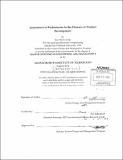| dc.contributor.advisor | Eric Rebentisch. | en_US |
| dc.contributor.author | Eralp, Ziya Deniz | en_US |
| dc.contributor.other | Massachusetts Institute of Technology. Engineering Systems Division. | en_US |
| dc.date.accessioned | 2014-01-09T19:55:18Z | |
| dc.date.available | 2014-01-09T19:55:18Z | |
| dc.date.issued | 2012 | en_US |
| dc.identifier.uri | http://hdl.handle.net/1721.1/83789 | |
| dc.description | Thesis (S.M. in Engineering and Management)--Massachusetts Institute of Technology, Engineering Systems Division, 2012. | en_US |
| dc.description | Cataloged from PDF version of thesis. | en_US |
| dc.description | Includes bibliographical references (pages 98-102). | en_US |
| dc.description.abstract | Improvement of business performance is an enduring subject of research across a diverse set of disciplines such as accounting, operations management, marketing, finance, economics and even psychology and sociology. In any discipline the ability to create self-awareness, a capacity to evaluate and compare their own behavior to internal standards and values, is a pre-requisite of improvement. In an organization, self-awareness is created with assessments. The results of assessments can help the organization to adapt to changing market conditions by defining more valuable objectives to direct its new businesses as well as to restructure its operations for eliminating deficiencies that limit its abilities to achieve its business goals at lower costs. For an organization with core businesses in product development (PD), assessment of PD is an essential element of all business improvement initiatives. However, in order to perform a focused PD assessment, the analysis needs to be structured with a systematic top-down approach which relates the findings of evaluations starting from high-level business goals down to the metrics for the most detailed operational activities. In this thesis, an existing Product Development Self-Assessment tool is integrated into this context, and implementation of a top-down assessment is presented using a three-step process. Other supplemental tools and methods are also incorporated into the discussion of the implementation framework such as; Goal-Question-Metric (GQM) and IDEFO function modeling methodologies. With the use of illustrative examples, the application steps of the framework and the use of supplemental methods are presented. | en_US |
| dc.description.statementofresponsibility | by Ziya Deniz Eralp. | en_US |
| dc.format.extent | 102 pages | en_US |
| dc.language.iso | eng | en_US |
| dc.publisher | Massachusetts Institute of Technology | en_US |
| dc.rights | M.I.T. theses are protected by
copyright. They may be viewed from this source for any purpose, but
reproduction or distribution in any format is prohibited without written
permission. See provided URL for inquiries about permission. | en_US |
| dc.rights.uri | http://dspace.mit.edu/handle/1721.1/7582 | en_US |
| dc.subject | Engineering Systems Division. | en_US |
| dc.title | Assessment of performance in the domain of product development | en_US |
| dc.type | Thesis | en_US |
| dc.description.degree | S.M.in Engineering and Management | en_US |
| dc.contributor.department | Massachusetts Institute of Technology. Engineering Systems Division | |
| dc.identifier.oclc | 865170808 | en_US |
